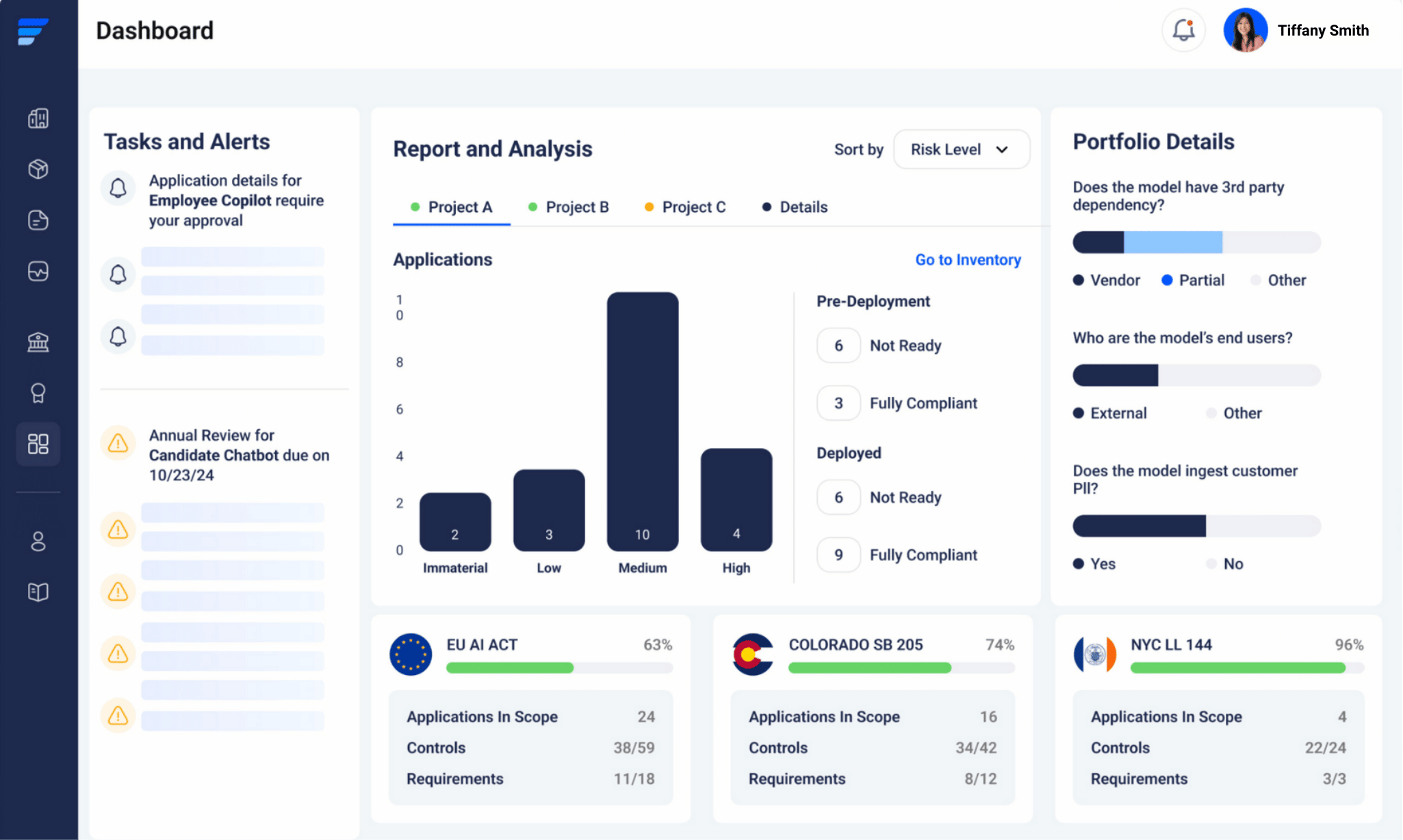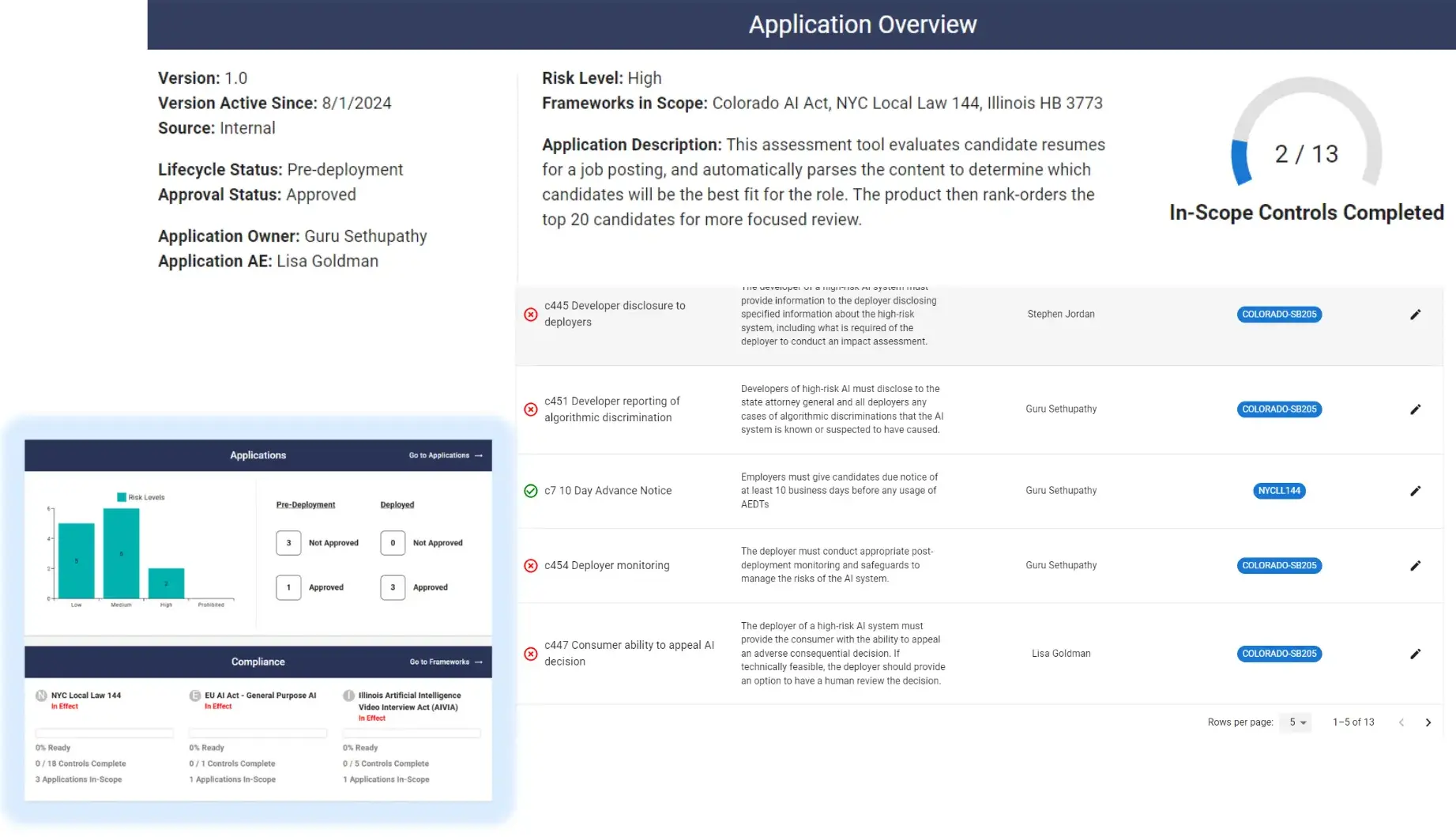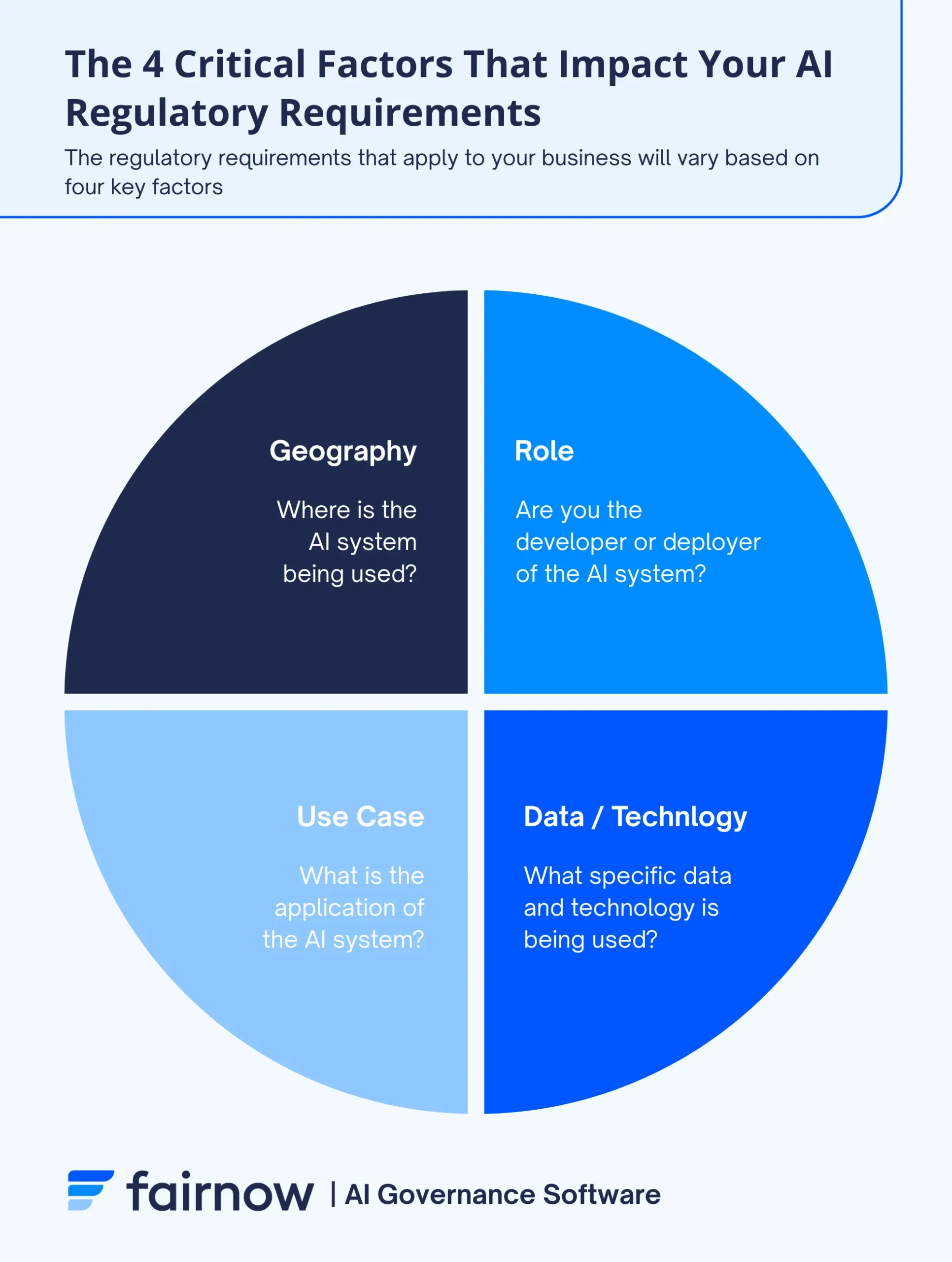AI compliance software
Stay Compliant with Evolving AI Regulations
Know what laws apply. Know what to do. Prove you’ve done it. All in one AI compliance software platform.
AI compliance requirements are expanding rapidly. FairNow’s AI compliance software simplifies this process, enabling you to proactively manage risk, automate controls, and prove adherence to every major law and standard. Our platform takes care of your AI regulatory compliance.

Free Demo: See How FairNow Ensures AI for Compliance
Proactively manage AI compliance with real-time oversight.

From 1 to 38 and Growing:
Stay Ahead of AI Regulatory Changes
AI regulation is complex and constantly changing. Staying on top of these changes is a full-time job unless you have a powerful partner like FairNow. Our compliance AI platform helps you monitor and mitigate your AI compliance in real time, so you’re never caught off guard.
Monitor regulatory changes in real time
Automatically track developments across global AI laws and standards. Get instant alerts when new rules apply to your AI systems and receive clear guidance on what to do next.
Identify which regulations apply and when
We help you assess your AI applications against emerging regulations like the EU AI Act, Colorado SB 205, South Korea Basic AI Act, and NYC Local Law 144. Our platform also aligns with key standards like ISO/IEC 42001 and NIST AI RMF, so you always get the full picture.
Streamline and Scale AI Compliance
Managing an entire portfolio of models, vendors, and teams is complicated. FairNow brings it all together on a single platform designed specifically for AI for regulatory compliance unlike general GRC, privacy, or InfoSec ai compliance solutions that were simply adapted to fit.
Automate repetitive compliance tasks
Reduce manual effort and eliminate the risk of human error by automating repetitive tasks like documentation, testing, and monitoring. Our AI compliance tools ensure nothing falls through the cracks.
Standardize how compliance gets done
Apply consistent controls across your entire AI portfolio, even if you’re using multiple models, vendors, or teams. This standardization creates a unified approach to AI for compliance.
Centralize your AI compliance view
Gain a single, comprehensive dashboard to track the compliance status of every in-scope AI application. See gaps, monitor activity, and manage accountability from one centralized location.

AI Compliance, Decoded — Guiding You Every Step of the Way
Compliance is more than just knowing the rules. It’s also about applying them correctly. With FairNow’s platform, you can deploy your AI systems with clarity and confidence. We break down complex regulations into simple, actionable steps.
Deploy tailored compliance frameworks
First, use our pre-built or customized frameworks aligned with industry regulations. We translate the complex requirements of AI regulatory compliance into clear, manageable steps so you can follow along easily.
Follow guided workflows
Then, receive task-by-task guidance on how to comply. Know what evidence is required, when it needs to be updated, and where to store it.
Automate documentation and audit prep
Finally, eliminate the last-minute scramble before reviews. Our platform automatically stores, timestamps, and organizes all compliance evidence at both the company and application levels, so you’re always ready for an audit. No more undocumented models or missed updates that may put your organization at risk.
Be Ready for What the Regulators—and Certifiers—Expect
Regulatory scrutiny is increasing, and your customers want proof of your commitment to responsible AI use.
FairNow simplifies the regulatory burden so you can focus on building, not bureaucracy.
Whether you’re deploying one model or fifty, our platform helps you get and stay compliant with the latest AI regulatory compliance standards, including:
Are you looking to get your AI system certified and in need of a third-party auditor? We can connect you with specialists who support companies through the certification process, providing clarity, readiness, and confidence every step of the way.
Ready to Simplify AI Compliance?
See how our AI compliance software helps you reduce risk, automate controls, and stay compliant as laws evolve.
AI Compliance Frequently Asked Questions (FAQs)
What is AI compliance?
AI compliance is the discipline of ensuring that AI systems are used responsibly, lawfully, and transparently across an organization. It involves understanding which regulations apply, implementing the right controls, and being able to prove—at any moment—that your AI is behaving as intended.
This isn’t just about risk mitigation. It’s about trust.
Effective AI compliance aligns model development and deployment with internal policy, external regulation, and public expectation. That includes things like tracking which models are in use, running risk assessments, documenting decisions, testing for bias, and being ready for audits.
It’s the difference between deploying AI—and deploying it responsibly.
“AI compliance is no longer an abstract concept. It’s an operational necessity. Organizations need to know which systems are in play, what risks they carry, and how to prove they’re in control. That’s what AI compliance delivers—clarity, accountability, and the foundation for trust,” says Guru Sethupathy, CEO of FairNow and former SVP at Capital One
What does AI compliance software do?
AI regulatory compliance software helps organizations ensure their AI systems adhere to relevant laws, standards, and ethical guidelines. Key capabilities include:
1) Real-time Regulatory Tracking: Stay informed as new laws emerge. FairNow updates compliance controls and sends alerts when requirements change.
2) Intelligent Risk Assessments: Many regulations follow a risk-based approach. FairNow provides structured risk assessments to support evidence and documentation for audits.
3) Reporting and Documentation Automation: Automate the generation of required evidence for internal governance, audits, and regulatory submissions.
What are the benefits of using AI regulatory compliance tools?
protecting the organization’s reputation and minimizing risk exposure.
AI compliance tools help you respond quickly to legal shifts and stay ahead of emerging requirements.
As organizational AI usage grows and regulatory compliance needs expand, organizations will lean on platforms like FairNow to track their usage to global regulatory requirements.
What are the AI compliance requirements for my business?
The regulatory requirements that apply to your business will vary based on a few key factors:
Geography: Different regions have varying regulations and standards for AI. For example, the European Union has stringent requirements under the GDPR and the upcoming AI Act, while the United States has a combination of state and federal regulations.
To complicate matters further, many regulations apply not only to organizations based in a particular region but also to those whose technology is used there.
Role: Compliance requirements can also differ based on your role (for example, are you the developer or the deployer of the AI system?) Developers must focus on creating AI that adheres to ethical guidelines, transparency, and bias mitigation from the outset. Conversely, deployers must ensure that the AI systems they implement are compliant with regulatory standards, properly governed, and used ethically.
Use case: The intended application of the AI technology influences the regulatory scrutiny it will face. High-stakes applications, such as resume screening or loan approvals, require more rigorous compliance measures than lower-stakes applications, like internal chatbots or recommendation engines.
Data/technology: The type of data being used and the type of AI technology deployed are crucial factors. Different types of data (e.g., personal, financial, medical) come with specific regulatory requirements. Similarly, the nature of the AI technology, such as generative AI (GenAI) or regression models, will determine the compliance framework. For instance, generative AI might require more stringent controls to prevent misuse or ethical breaches, while regression models may focus more on accuracy and fairness.
All these factors can lead to wildly different regulatory compliance needs. Two businesses in the same building, creating similar technology, may face vastly different regulatory requirements.
Are you unsure how to build a strategy for these impending regulations? Let FairNow help you identify exactly which of your models are in scope for which regulations.
Receive alerts as AI compliance requirements change and shift to ensure you are always ahead current and emerging regulations and standards including:
Which companies benefit most from AI compliance & governance software?
When investing in AI regulatory compliance software, organizations must consider geography, role, use cases, and data/technology. The need for AI governance software will differ from organization to organization.
Consider these three examples of varying AI risk compliance needs:
- AI-Enabled Candidate Sourcing Tool: Resume-screening startups often need AI compliance software for bias detection, audit trails, and regulatory reports due to their low risk tolerance and stringent employment laws.
- Enterprise Financial Services: Enterprises in finance face regional complexity and high-risk exposure like lending and loan approval, and are in need of AI compliance software to manage complexity, ensure regulatory adherence, and maintain centralization across regions.
- Small Marketing Agency: Small marketing teams using ChatGPT may not need software—yet. Due to low risk and minimal regulatory exposure, it can handle compliance manually, so it likely does not need specialized software for now.*
*Note: As companies and regulations evolve, organizations must revisit their regulatory compliance strategy to remain compliant.
FairNow’s AI regulatory compliance tools can be customized and updated based on industry, geography, and risk tolerance.
Why do organizations invest in AI compliance tools?
To minimize regulatory risk, protect their reputation, and reduce the cost of compliance. As a result, automation and real-time alerts help teams stay focused on innovation—without falling behind.
Which laws and regulations are tracked by FairNow's AI compliance and governance software?
FairNow tracks 25+ global AI regulations and voluntary standards, including:
We keep it updated so you don’t have to.
Who provides AI compliance software?
FairNow provides AI compliance tools embedded within its AI governance platform. Clients gain access to centralized frameworks, documentation workflows, and real-time compliance monitoring.
Is FairNow designed for developers, compliance teams, AI governance teams, or business leaders?
FairNow is built for cross-functional use. Compliance leaders use it to oversee governance. Developers and data scientists use it to test and track models. Executives use it to monitor risk and ensure alignment with policy and regulation.
Can we integrate this with our existing AI model registry or risk systems?
Yes.
FairNow is designed to integrate with your existing model registry, risk management tools, and governance processes. We can ingest model metadata, compliance documentation, and risk scores to ensure alignment across your workflows.
How quickly can we get started?
Most organizations can begin using FairNow in days—not months. Our onboarding process includes guided configuration and prebuilt templates to help you operationalize quickly based on your current maturity



